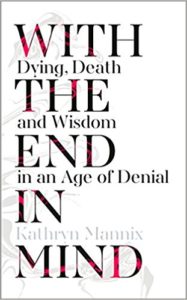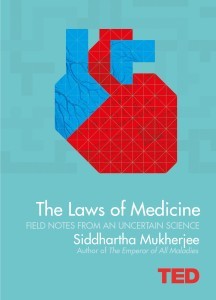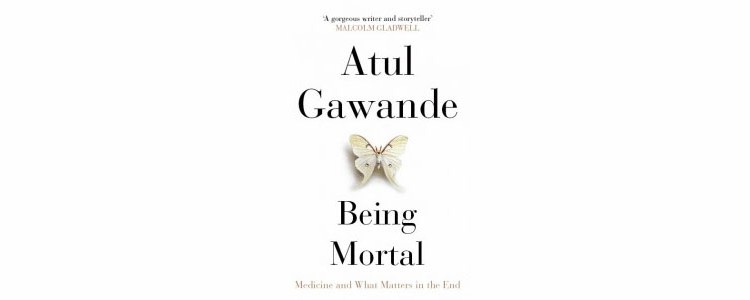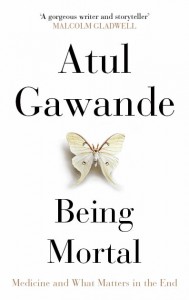“With the End in Mind: Dying, Death and Wisdom in an Age of Denial” by Kathryn Mannix
 Bereaved people, even those who have witnessed the apparently peaceful death of a loved one, ofen need to tell their story repeatedly, and that is an important part of transfering the experience they endured into a memory, instead of reliving it like a parallel reality every time they think about it.
Bereaved people, even those who have witnessed the apparently peaceful death of a loved one, ofen need to tell their story repeatedly, and that is an important part of transfering the experience they endured into a memory, instead of reliving it like a parallel reality every time they think about it.
And those of us who look after very sick people sometimes need to debrief too. It keeps us well, and able to go back to the workplace to be reqounded in the line of duty.
….
Cognitive therapist and palliative medicine pioneer Kathryn Mannix’s With the End In Mind is a collection of medico-narrative stories which focus on the stages of dying. Usually the stories focus on terminally ill patients as it is in such scenarios the patients and their families are anxious and fearful of impending death. The stories are based on decades of her experience with the NHS in UK. They are stories which work equally well as case studies and for the benefit of getting the point across well at times Dr Mannix has clubbed together experiences of more than one patient in one narrative. These are grouped in sections such as “Patterns”, “My Way”, “Naming Death”, “Looking Beyond the Now”, “Legacy” and “Transcendance”.
The stories included in the volume are extraordinary. It is not only the magical quality to the storytelling of experiences while sitting by a patient’s deathbed but it is the calm sense of peace and kindness that pervades every single story. Undoubtedly the crippling anxiety that grips every patient and their families as death approaches has its impact on the families. Every one has a different response mechanism in managing the situation. These may be defined by an individual’s choice of the cultural codes of behaviour they have learned to adopt while processing the dastardly news. The stories are about the experiences of all ages of patients including those who have died in hospitals or those who have died at home surrounded by family. It is always the conversations about dying with every person and their caregivers that may never be easy but has to be conducted.
Notice how often you hear euphemisms like ‘passed’, ‘passed away’, ‘lost’, in conversations and in the media. How can we talk about dying, plan our care or support those we love during dying, theirs or ours, if we are not prepared to name death?
There are many conversations recounted that are memorable for demonstrating to a lay person and the medical professional that certain bedside manners with a large dose of humility, patience, honesty, level headedness, cultural sensitivity, and empathy are required when on a death watch whether offering solace to keening mothers who have lost their babies or even the elderly. There is one particularly straightforward conversation the “leader” ( head of the hospice where Dr Mannix worked as a young physician) had with a WWII French resistance woman called Sabine who wears her Resistance Medal and who withstood the terror of war and yet was afraid of death. She was an elegant eighty-year-old inmate who was always well mannered and well turned out. Kathryn Mannix was a young trainee in the new speciality of palliative medicine. Her trainer was the consultant in charge of the hospice who had a good rapport with Sabine as he was bilingual and would at times converse with her in French. So when he decided to have the conversation about dying with her in the presence of the nurse to whom she had confided her fears and the young physician Kathryn Mannix, no one was prepared for how the conversation would develop. For the young Kathryn Mannix this particular episode was transformative and has lived with her throughout her career as if on a cinema reel. It formed the basis of her future practice, teaching her to be calm in the face of other people’s storms of fear and “to be confident that the more we understand about the way dying proceeds, the better we will manage it”. She realised over decades of clinical practice that:
The process of dying is recognisable. There are clear stages, a predictable sequence of events. In the generations of humanity before dying was hijacked into hospitals, the process was common knowledge and had been seen many times by anyone who lived into their thirties or forties. Most communities relied on local wise women to support patient and family during and after a death, much as they did ( and still do) during and after a birth. The art of dying has become a forgotten wisdom, but every deathbed is an opportunity to restore that wisdom to those who will live, to benefit from it as they face other deaths in the future, including their own.
It is curious that Dr Mannix refers to the “art of dying being a forgotten wisdom” as coincidentally historian and chronicler of Delhi and accomplished Urdu translator Rana Safvi mentioned that she has read an account of daily life within the Red Fort during Mughal times where existed a category of women called khair salla waaliyan. They were employed in the Red Fort presumably by the noble families. Their job was to look after well being of the family. They weren’t necessarily nurses or care givers but who could make people feel good. She thinks their job was to look after the emotional well being of the people being left behind the dying person. None exist now. It is only the professional mourners like the rudalis who continue to exist in Indian society.
[bwwpp_book sku=’97815011732400000000′]
Preparation for death is culturally specific too as with the Swedish ‘Döstädning’, or ‘death cleaning’ which is the focus of Margareta Magnusson’s The Gentle Art of Swedish Death Cleaning discussed beautifully in Christina Patterson’s essay “The ‘new hygge’: downshifting for death“. Journalist Arifa Akbar in her interview with Dr Mannix asked a pertinent question noticeable by its absence in the book itself:
AA: The people whose stories you tell in the book do not ever talk about God or an afterlife. Did you edit out these discussions? (You have said that you didn’t want to discuss religion in the context of end-of-life as it can be polarising and unhelpful.) Could you say if some patients do talk about this aspect and if it is helpful to them?
KM: People’s spirituality manifests in different ways. Where this is a religious faith, then people do discuss God and their hopes, anxieties and desires for an afterlife, as well as measuring their personal worth against the constructs of their faith. I’ve met people hopeful for heaven, fearful of hell, anticipating reincarnation, angry with God, or leaving their fate entirely in Divine hands; I’ve met people with no belief and at peace with the idea of oblivion, and others feeling sad at the ending of self-awareness; I’ve met people who have lost their longstanding faith in the face of the perceived injustice of illness; I’ve met people who discover a faith amidst the emotional storms of terminal decline.
Dr Mannix offers some thought provoking options to initiate conversations about dying as well as a way for the mourners to come to terms with their grief such as death cafes where people in similar situations could gather and share their experiences. She also provides template of a letter with possible points to consider for having a conversation about dying. She shares a list of resources that can be considered to prepare for this ultimate stage of life and recommends watching Australian intensive care specialist Dr Peter Saul’s TED Talk “Let’s Talk about Dying” ( Nov 2011). She also acknowledges Dr Atul Gawande’s books too.
With the End in Mind is a devastatingly powerful book of which extracts must be made available freely. It is certainly a book to be read cover to cover and take its learnings to heart, make them your own. Persuade those who are anxious about the deteriorating health of their loved ones to read it. It is going to be a near-impossible task, but try nevertheless. It is unsurprising that this book is on the Wellcome Book Prize 2018 longlist. Well deserved recognition!
Kathryn Mannix With the End in Mind: Dying, Death and Wisdom in an Age of Denial ( William Collins, an imprint of HarperCollins Publishers, London, 2017. Pb. pp.340 Rs 599
12 March 2018










